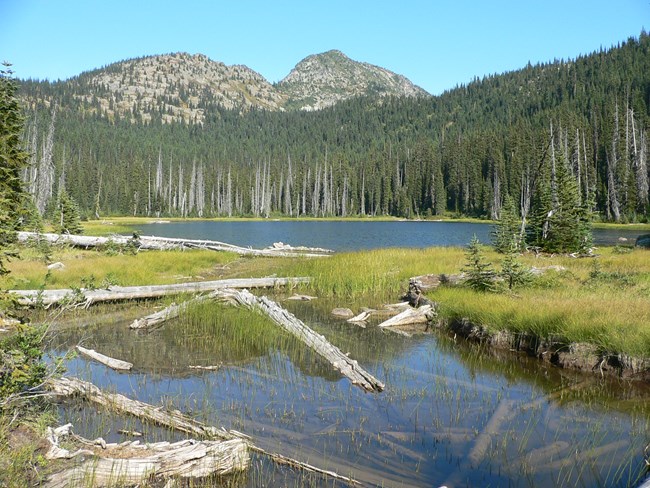|
[W]e have a profound, a fundamental need for areas of wilderness - a need that is not only recreational and spiritual but also educational and scientific, and withal essential to a true understanding of ourselves, our culture, our own natures, and our place in all nature.

NPS The Dagger Lake Trail leads to a shallow lake set in a backdrop of peaks, and a 6064 foot (1850 m) pass with good views and excellent fall foliage colors. Day hikers approach from the east via US Forest Service trails, while the western approach is longer and usually requires backpacking. Stock parties can ride in from either direction. Fishing is popular. Hikers can explore the area around the pass, including deep and rocky Stiletto Lake to the north. Special Concerns:
Backcountry Camping: A backcountry permit is required for all overnight stays. Permits are limited. There is both a hiker and a stock camp near the shores of Dagger Lake. Cross-country travel and camping are allowed at Stiletto Lake, at least one mile distant from Dagger Lake. Campfires are not allowed at Stiletto Lake--please help protect this lake basin by bringing a camp stove. Access via State Route 20: Drive SR 20 to mile 159, just east of Rainy Pass. The parking lot is located on the north side of the highway. To access the trail, cross the highway and look for a short connector trail that takes you to the main trail, Bridge Creek (Pacific Crest) Trail. This is a USFS trailhead and parking requires a Northwest Forest Pass or federal recreation access pass, available at any ranger station. Access via Twisp River Road: From the town of Twisp, follow the Twisp River Road almost to it's end, and park in the signed area 0.4 miles before Road's End Campground. A Northwest Forest Pass or federal recreation access pass is required to park, and is available at any ranger station. 
NPS / Chelsea Gudgeon 
|
Last updated: September 1, 2021
